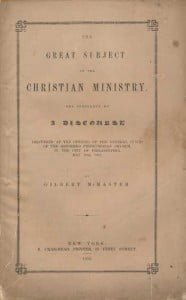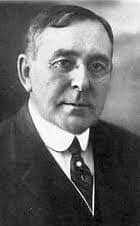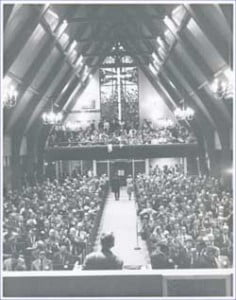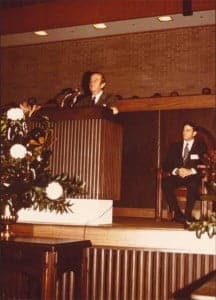A Consistent Christian Life
Pastor Ken McHeard is the current pastor of the Reformed Presbyterian Church (PCA) in Duanesburg, New York. He follows a long and eminent lineage of pastors at that church. The organizing pastor was the Rev. James McKinney, who served the church from 1797-1802. The second pastor and the subject of our post today, the Rev. Gilbert McMaster, served the Duanesburg congregation in a lengthy pastorate, from 1808-1840.
Gilbert was born near Belfast, Ireland, on February 13, 1778. Of his parents, it was said that “his father was a man of intelligent and earnest piety,” and that his mother “was very respectably connected, was a person of superior intellect and great force of character.” Gilbert enjoyed the advantages of a faithful Christian education and at the age of eighteen came to a public profession of his faith in Christ as his Savior. This was some five years after the family had immigrated to the United States and settled in Franklin county, Pennsylvania. Gilbert continued his education at the Franklin Academy and Jefferson College before beginning medical studies, and was admitted to the medical practice in 1805, becoming a physician in the borough of Mercer, PA.
But it was not even three years, in 1807, when Dr. Alexander McLeod and Dr. Samuel B. Wylie sought him out, urging him to consider his calling to the ministry. McMaster had a high view of the ministry and shrank from thinking that he could himself be so called. But McLeod and Wylie prevailed, and as Gilbert’s studies had always included theological education, he was found ready in late October of that year to pass his examinations before the Presbytery. On August 8, 1808, he was installed as the pastor of the Reformed Presbyterian Church of Duanesburg, New York.
Rev. McMaster served the Duanesburg congregation for thirty-two years before answering a call to serve another church, this time in Princeton, Indiana. Here again, his labors were blessed of the Lord, though his years were cut short, with failing health compelling him to surrender the pulpit in 1846. He died, after a brief but painful illness, on March 17, 1854, “closing a consistent Christian life with Christian dignity and composure.”
Rev. McMaster’s son, Erasmus, provided an interesting glimpse of his father’s ministry:
“The ordinary course of Dr. McMaster’s pastoral ministration was in conformity with the customary order of many of the Scottish Presbyterian Churches. Usually the Sabbath morning service was an exposition of some Book of Scripture inn course, with doctrinal and practical observations, accompanied by the ordinary devotional exercises. The subject of the afternoon’s discourse was either some branch of the morning’s exposition, selected for fuller development, elucidation and application; some head of Christian doctrine, or some theme suggested by the various circumstances and occasions of his congregation or of the times. These services of the Sabbath he supplemented, during the week, by regular pastoral visitation and by biblical and catechetical instruction of the young at stated times. His usual written preparation for the pulpit consisted only of short notes, filling from two to four pages of a small duodecimo volume [a book about 5 x 7.5 in.], and briefly marking the heads of his discussion, and the more important particulars, with references to apposite Scriptures for illustration, confirmation and enforcement. His subject, thus briefly noted, he carefully thought out in its matter, relying on the occasion of the delivery for the language.”
The son of one of McMaster’s closest friends gave this report of Rev. McMaster’s final days:
“Dr. McMaster’s last days were spent in delightful serenity in the house of his accomplished son, the Rev. E. D. McMaster, brightened by the companionship of the wife of his youth, one of the kindest and purest of Christian women, and sustained by the respectful love of his sons, and the soothing attention of his two amiable daughters. The habitual modesty and reserve of his character continued unaltered to the last, but his long, self-sacrificing, useful and holy life was his best testimony for God.
Words to Live By:
If you are known as a Christian, whether in your work place or elsewhere, know that people do watch you. They watch your words, but more importantly, they watch to see if your character backs up your words. A strong Christian testimony rests on first on the Word of God, but the world looks to see God’s Word reflected in your life. “But someone may well say, ‘You have faith and I have works; show me your faith without the works, and I will show you my faith by my works.’ ” (James 2:18, NASB)
 Some of the works authored by Rev. McMaster include:
Some of the works authored by Rev. McMaster include:
The Duty of Nations: A Sermon on a Day of Public Thanksgiving.
The Embassy of Reconciliation: An Ordination Sermon.
An Essay in Defence of Some Fundamental Doctrines of Christianity.
The Shorter Catechism Analyzed.
An Apology for the Book of Psalms.
Ministerial Work and Sufficiency: An Ordination Sermon.
The Moral Character of Civil Government.
The Obligations of the American Scholar to his Country and the World.
Speech in Defence of the Westminster Confession of Faith against the Charge of Erastianism.




